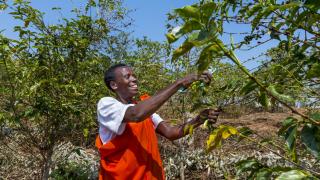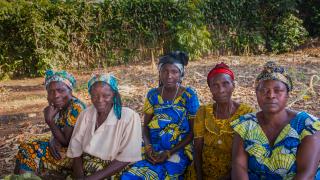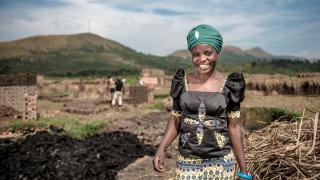Celebrating International Day of the Girl Child
Women across the globe have their lives upturned by war each day. They are frequently forced to act as human lightning rods in conflicts within the home and beyond. Young women bear the brunt of this conflict.
Today, on International Day of the Girl Child, and every day, Women for Women International strives to lift women to achieve their greatest potential both financially and socially so that they can lift their daughters in turn.
As young girls have their childhoods cut short, so are their chances of continuing school and getting good jobs later.
UNESCO estimates that 15 million girls of elementary school age will never enter a classroom. Half of these girls reside in countries in sub-Saharan Africa.
15 million
Currently, 59% of school-aged girls (5-17 years old) are enrolled in school. Our goal is to help mothers find strength through their education so that they can help their daughters do the same.
Through our programme, women realise their skills for entrepreneurship, negotiation, and family planning. Many of our women describe how they plan to use the money that they earn and save.
In February 2006, Julienne enrolled in the Women for Women International programme in the Democratic Republic of Congo, where she received training in small business development.
She learned the value of working as a team with her sisters in our DRC programme, who devised a scheme to invest $5 (USD) of their supporter funds in each other’s businesses, providing a lump-sum of $80 (USD) to each woman on rotation.
This investment allowed her to build her small business and meet other household needs. She invested some of the money in a Culinary Arts training programme, for which she received a Programme Attendance Certificate with distinction as one of the best students in her class.
She used the training to teach her daughter the culinary skills she learned, adding value to her home and investing in her daughter’s future.
For Faith, Women for Women International - Nigeria programme participant, taking care of her daughters on her own and providing for the family has always been a challenge.
"Before I joined the programme, I was selling rice. But I didn’t know how to calculate whether I was making a profit, or losing money. Women for Women International has taught us how to record our finances, so now I know when my business is successful.”
Faith uses the profits from her business, selling jumpers to a local school, to pay school fees for her daughters, and to buy food for the family.
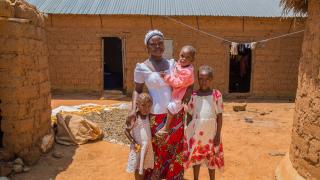
My hope for the future is to provide a good education for my daughters. I will also teach them how to knit, so they have a skill.
Many of the women we serve have shared that they are proudest when they can provide for their daughters and secure for them a future that includes education and autonomy.
Many of our participants describe the futures that they envision for their daughters. They learn to discuss with other women in their communities about breaking down the barriers of some traditions such as childhood and forced marriage and gender-based violence.
These issues continue to limit the rights of women and girls. UNICEF reports that 1 in 5 girls in the world are said to be married before the age of 18.
Currently, over 650 million women alive were married as children. Childhood marriage virtually eliminates any educational opportunities for girls and often condemns them to a life without knowledge of their rights.
The Women for Women International programme works with women to end these harmful practices and replace them with ones that encourage equal opportunity.
These mothers and female caretakers learn the power that education gives them through our programme and ultimately desire to create a generational ripple effect.
Furera, a participant of Women for Women International’s year-long training programme in Riyom, Plateau State, Nigeria, said:
“The Women for Women International programme has brought about behavioural change too as I now see girls being enrolled in school. We were taught the effects of early child marriage especially in girls, we now know that our children are not to get married under the age of 18, and this has help to reduce early marriage in my community."
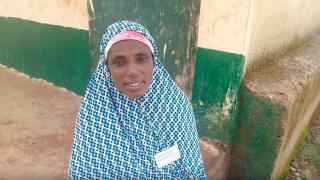
I was able to increase the quantity of my cooked beans paste and increase my savings which has helped me pay my children school fees.
After graduation, women are confident as they look to the future and the futures of their children.
They use their stipends to rebuild their lives, take loans out of community savings groups, and eventually use their earned money to pay for school supplies and educational fees for their daughters to continue their education.
Mary, Women for Women International - Rwanda programme graduate, said:
“I took a loan out of the savings group I’m part of to pay for my daughter’s school fees. I know this is a good investment because my daughter is bright and very soon, she will go to university.”
Though our women continue to struggle to retake their lives and regain stability for their families and in their communities, they find the strength within themselves to move forward.
They fight not only to find identity and power in themselves, but to help instil it in their daughters, so that they may lead the next generation out of conflict and into a peaceful and equal future.
For my daughters, I can defend them and support them for their rights.
For privacy reasons, representative photos have been used for Julienne's and Mary's stories.
Continue reading
For World Entrepreneurs’ Day, we’re celebrating some recent success stories from businesswomen in Rwanda, DRC and Nigeria.
The Power of Friendship
subtitle:
'It’s not only the money but the way we gather together that has changed my life.’ On International Friendship Day, women survivors of war share what friendship means to them.
My Name is Cinama
subtitle:
After graduating from our 12 month programme in the Democractic Republic of Congo, Cinama went on to start her own brickmaking business. She now shares her knowledge with other women and is looked up to as a role model.

